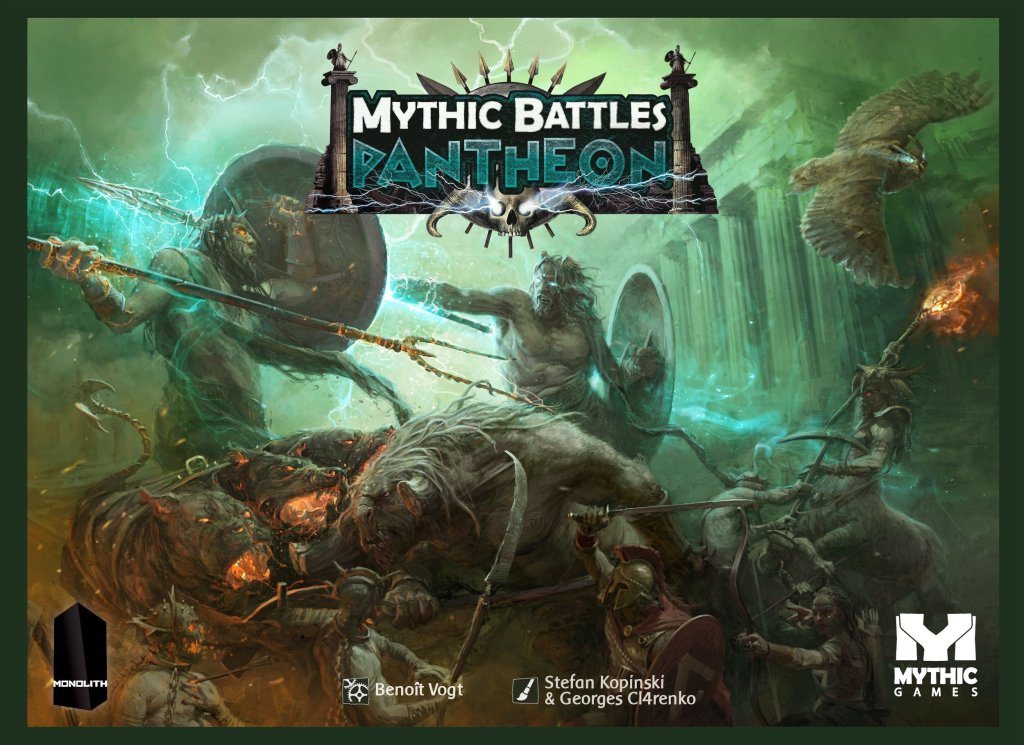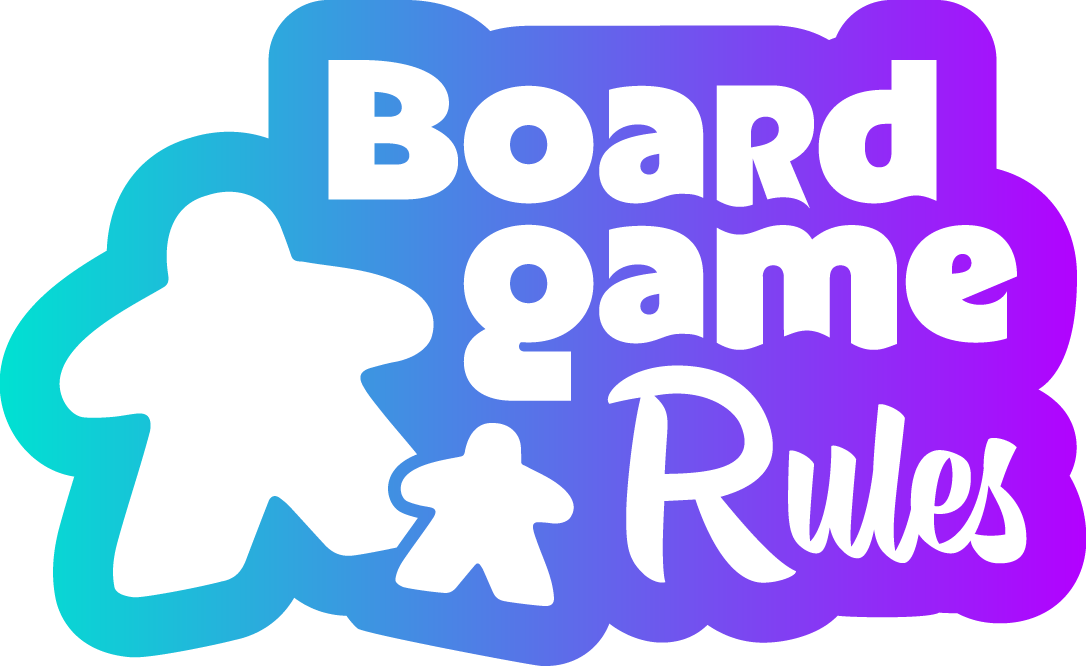Mythic Battles: Pantheon
2017
Embark on an epic journey as a surviving Greek god in Mythic Battles: Pantheon. Gather shards of lost power, command mighty warbands, and reshape the new Pantheon!
90
minutes
2 - 4
player(s)
14+
Medium Heavy


About the game
Mythic Battles: Pantheon is a truly immersive board game that transports players to the heart of Ancient Greek mythology. Here, gods, demigods, and heroes vie for control, showcasing their powers and strategic prowess on a battlefield that’s as unpredictable as it is thrilling.
Set against the backdrop of a war-torn Olympus, the game sees players assuming the roles of Greek gods, each with their own unique abilities and attributes. As a player, you’ll recruit mythical heroes and creatures, gather artifacts, and harness the very elements to help you defeat your opponents and claim victory. The setting, imbued with the rich tapestry of Greek mythology, is as much a character in the game as the gods and heroes themselves.
Read More
Setup and rules summary
Game components Unboxing the fun!
Mythic Battles: Pantheon is a board game that involves strategy and role-playing. Players use gods, heroes, and monsters from Greek mythology to fight each other and claim victory. Here are the components included in the game and their roles:
1. Game Board: The game board represents the ancient world where the battle takes place. It has areas marked for movement and combat.
2. Miniatures: These are the figures that represent the gods, heroes, and monsters that players use in the game. Each miniature has a corresponding character card.
3. Character Cards: These are cards that detail the abilities of the gods, heroes, and monsters. Each card shows the character’s stats and special abilities.
4. Activation Cards: These cards are used to activate the characters. The number of activation cards a player has determines the number of actions they can take in their turn.
5. Art of War Cards: These cards are used to perform special actions such as drawing more cards, activating more characters, or using a character’s special ability.
6. Dice: Dice are used to resolve combat. The number of dice rolled depends on the character’s stats and the type of attack they are making.
7. Tokens: These are used to mark various states in the game, such as a character’s health, special abilities, and the effects of spells or abilities.
8. Draft Cards: These cards are used in the drafting phase of the game, where players select the gods, heroes, and monsters they will use in the game.
9. Omphalos Tokens: These tokens represent the divine energy that characters can collect to increase their power. A god character that collects enough Omphalos can achieve ultimate power and win the game.
All these components interact with each other to create a dynamic and strategic game. Players must balance their use of character abilities, activation cards, and Art of War cards to outmaneuver and defeat their opponents. The game ends when a player’s god achieves ultimate power by collecting enough Omphalos, or when all of an opponent’s characters have been defeated.
Game flow Round and round we go
Mythic Battles: Pantheon is a miniatures board game filled with epic adventures and challenges where players take on the role of Greek gods or heroes. The game is played in rounds, each divided into several phases. Below is the detailed structure of the game:
Setup Phase
- Selection of Gods and Heroes: Each player chooses a god or hero to play as. Each character has unique abilities and powers that affect gameplay.
- Building the Board: Players build the game board by placing tiles together. The game includes a variety of tiles, each with different terrain features that affect movement and combat.
- Placement of Units: Players place their units (figures representing gods, heroes, and monsters) on the board. The placement of units is strategic, as it influences the starting positions and initial confrontations.
Activation Phase
- Choosing Active Units: At the beginning of each round, players choose which of their units to activate. The choice depends on the situation on the board and the player’s strategy.
- Movement: Active units can move across the board. The distance they can move is determined by their movement value. Some terrain features can hinder movement.
- Attack: Units can attack enemy units within their range. The outcome of an attack is determined by rolling dice and comparing the result to the target’s defense value.
- Use of Special Abilities: Some units have special abilities that can be used during this phase. These abilities can have a variety of effects, such as healing allies or dealing extra damage.
Recruitment Phase
- Acquiring New Units: Players can recruit new units to their side. To do this, they must spend points that they earn during the game. The cost of units varies depending on their power and abilities.
End Phase
- Checking Victory Conditions: At the end of each round, players check to see if any of them have met the victory conditions of the game. These conditions can vary depending on the scenario being played.
- Preparation for Next Round: If no player has won, the game continues to the next round. Players prepare for this by resetting their units’ activation statuses and replenishing their points.
In Mythic Battles: Pantheon, strategic planning, resource management, and tactical decision-making play crucial roles. The game continues until a player meets the victory conditions, thus becoming the victor.
Players'turn One turn to rule them all
Mythic Battles: Pantheon is an exciting board game centered around mythical gods, monsters, and heroes. During each player’s turn, there are several actions they can take. These actions, and the strategic choices they entail, can greatly affect the course of gameplay. Here’s a thorough breakdown of what happens during a player’s turn:
Activation Phase:
-
Each player begins their turn by selecting a unit from their troops to activate. This could be a god, monster, or hero. The choice of which unit to activate is strategic and can impact the outcome of the game. For instance, activating a god or monster could give a player more power or abilities to use during their turn.
-
The player then decides how many actions the activated unit will perform. Each unit can perform up to two actions per turn, which could include moving, attacking, or using a special ability. However, the same action cannot be performed twice in the same turn. Deciding the number and type of actions is another strategic decision that can affect gameplay.
Action Options:
-
Moving: The player can choose to move their activated unit. The number of spaces a unit can move depends on its speed stat. Moving can be used strategically to position a unit for attack, or to evade an enemy’s attack.
-
Attacking: The player can choose to have their activated unit attack an enemy unit. The success of an attack depends on a unit’s attack stat and the roll of a dice. Attacking can be used strategically to weaken or eliminate enemy units, potentially giving a player an advantage.
-
Using a Special Ability: Many units have special abilities that can be used during a player’s turn. These abilities can range from healing a unit, to causing damage to an enemy, to altering the game board in some way. Using a special ability is often a strategic choice that can greatly impact gameplay.
After the player has completed their actions, their turn ends and it’s the next player’s turn. The game continues in this way, with players strategically activating units and choosing actions, until one player achieves the game’s victory condition.
End of the game All good games must come to an end
Mythic Battles: Pantheon is a strategic board game that ends when a player achieves victory by fulfilling specific conditions. The steps that follow detail the victory conditions and the actions that must be taken before final scoring.
Victory Conditions:
- Elimination of the Opponent’s God: The primary and most straightforward way to win in Mythic Battles: Pantheon is by eliminating your opponent’s God. Once a player’s God has been defeated in battle, that player loses the game immediately.
- Achieving Omphalos Absorption: As an alternative, players can win by absorbing a certain number of Omphalos, mystical stones that provide power to the Gods. The specific number required depends on the number of players in the game. In a two-player game, the first player to absorb four Omphalos is declared the winner. For games with three or four players, the required number is three.
Actions Before Final Scoring:
- Resolve Any Pending Battles: If there are any pending battles at the end of a player’s turn, they must be resolved before any victory conditions can be checked. This includes battles that may result in the defeat of a God or the absorption of an Omphalos.
- Check for God’s Survival: After resolving all pending battles, players must check if their God is still on the board and has not been eliminated. If a God has been defeated, the game ends immediately, and the player with their God still standing is declared the winner.
- Count Absorbed Omphalos: If no Gods have been defeated, players count the number of Omphalos they have absorbed. The player who reaches the required number first, depending on the number of players, is declared the winner. If no player has reached the required number, the game continues to the next turn.
Scoring Did you outsmart your rivals?
Mythic Battles: Pantheon is a board game that combines strategic planning, quick decision-making and a dash of luck. The game is won by accumulating the most victory points, which are awarded based on several criteria.
Victory Points: Players earn victory points in the following ways:
- Gods: Players earn 2 victory points for each god they control at the end of the game.
- Monsters and Heroes: Players earn 1 victory point for each monster or hero they control at the end of the game.
- Troops: Players earn 0.5 victory points for each troop they control at the end of the game.
- Omphalos: Players earn 1 victory point for each Omphalos they have absorbed with a God or Monster by the end of the game.
At the end of the game, the player with the most victory points wins. If there is a tie, the following tie-breaking rules are applied:
- Omphalos: The player with the most absorbed Omphalos wins.
- Gods: If there is still a tie, the player with the most gods wins.
- Monsters and Heroes: If there is still a tie, the player with the most monsters and heroes wins.
- Troops: If there is still a tie, the player with the most troops wins.
- Draw: If there is still a tie after applying all the above criteria, then the game is a draw.
In Mythic Battles: Pantheon, strategic use of your units and clever management of your resources are key to outmaneuvering your opponent and achieving victory.
Particular Cases and Exceptions Wait… is that legal?
Mythic Battles: Pantheon is a complex board game with a rich rulebook. While the basic rules are straightforward, there are certain rare or special rules and exceptions that players should be aware of. This article will clarify some of these rules to help players fully enjoy the game.
1. Art of War Cards: One of the unique aspects of Mythic Battles: Pantheon is the use of Art of War cards. These cards allow players to perform special actions, such as activating a God or recruiting a unit. However, it’s important to note that these cards can’t be used to re-activate a unit during the same turn.
- Exception: Players can’t hold more than four Art of War cards in their hand at the end of their turn.
2. Absorption: This is a special ability that allows Gods to absorb damage dealt to them. Instead of taking damage, they can absorb it and use it to power their special abilities.
- Exception: Gods can only absorb damage if they have an available slot in their absorption track.
3. Omphalos Stones: These are special items that Gods can collect to boost their abilities. However, only Gods can collect Omphalos, and they can’t be collected by troops or heroes.
- Exception: Omphalos can’t be collected if the God is engaged in combat.
4. Troop Organization: Troops must be organized in a specific way, with each troop occupying a different area. However, they can move freely within their area.
- Exception: Troops can’t move or be moved into an area occupied by an enemy.
5. Combat: During combat, the attacker and defender each roll a number of dice equal to their attack or defense value. The player with the highest total wins the combat.
- Exception: If the defender wins, they don’t inflict any damage to the attacker. Instead, the attacker’s unit is pushed back to an adjacent area.
6. Building Talents: Some units have the ability to build structures. This requires the unit to spend a full turn building and they cannot do anything else during this turn.
- Exception: Units cannot build structures if they are engaged in combat.
These are some of the special rules and exceptions in Mythic Battles: Pantheon. Understanding these rules can greatly enhance your gameplay and strategy.
Tips and tricks Play smarter, not harder!
Mythic Battles: Pantheon is a board game that combines strategy, combat, and mythology. Here are some strategies, beginner tips, and common mistakes to avoid that can help you optimize your gameplay.
Advanced Strategies:
- Use the Terrain to Your Advantage: The game’s terrain is not just a beautiful backdrop, it can be a strategic advantage. Utilize them to block opponents or to gain extra movement or attack benefits.
- Plan Your Power Usage: Each god has unique power abilities. Plan your power usage carefully, considering both short-term and long-term strategies. Make sure not to exhaust all your powers in a single round.
- Balance Your Army: A balanced army has a mix of ranged and melee units. Too many of one type can leave you vulnerable to the other.
Beginner Tips:
- Understand the Rules: Before you start playing, make sure you understand the rules, especially the combat system and the abilities of the gods.
- Start with Simple Scenarios: As a beginner, start with the simpler scenarios before moving on to the more complex ones. This will help you get a feel for the game mechanics.
- Observe Other Players: If possible, watch other players before you start your own game. You can learn a lot from their strategies and mistakes.
Common Mistakes to Avoid:
- Underestimating the Importance of Omphalos: Omphalos are needed to power up your gods. Many beginners overlook their importance and focus solely on combat.
- Ignoring Defense: It’s not all about attack in Mythic Battles: Pantheon. A good defense is equally important. Don’t leave your units unprotected.
- Not Adapting to Your Opponent: Every player will have a different strategy. Don’t stick rigidly to your plan if it’s not working. Be flexible and adapt your strategy based on your opponent’s moves.
Optimizing Gameplay:
- Know Your Units: Each unit in your army has unique abilities. Understand these abilities and use them strategically to optimize your gameplay.
- Manage Your Resources: Managing your resources, both units and Omphalos, is key to winning. Use them wisely and strategically.
- Communication: In team games, communication is key. Make sure to coordinate your strategies with your team members.
